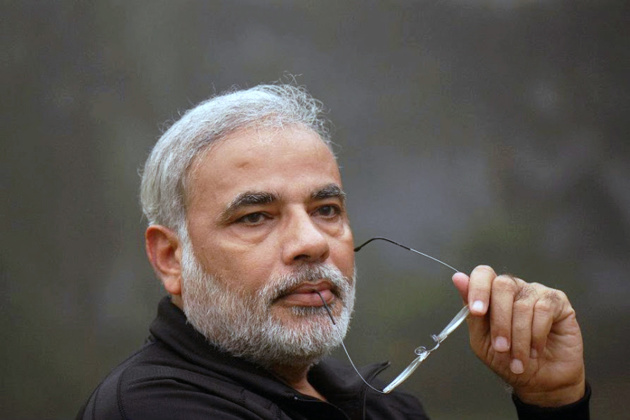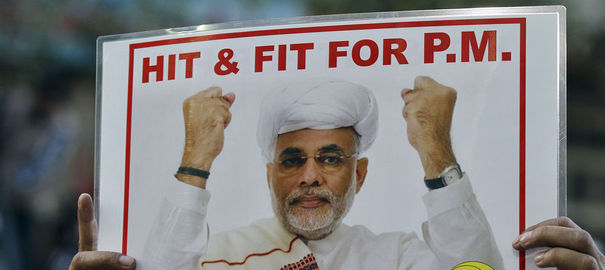
Narendra Modi | Credits -- Official Google + Page N.Modi
This decision of BJP is reported to have been orchestrated by RSS (Rashtriya Swayamsevak Sangh) who is the ideological parent of this party. This decision has come after several months of tussle within the party on the question to nominate their Prime Ministerial candidate. The newly elected party chief Rajnath Singh put in his best effort to get the party to voice Modi as their candidate for the Lok Sabha elections scheduled to be held next year. The daily newspaper “The Hindu” in their editorial called this an ‘aided democracy’, explaining the upper hand that RSS has over the party. The editorial also states that despite the Sangh’s authority it has taken them a while to officially declare this decision.
Electing the Prime Minister
In India, it is not necessary to nominate their Prime Ministerial candidates prior to elections. After the election results are announced the party with highest number of seats in Lok Sabha (House of People) sets to form a government either on their own or with the support of a coalition, depending upon the number of seats.
The selection of the Prime Minister is required only at this stage. The elected Members of Parliament (MPs) come to a decision regarding the Prime Minister. It is not necessary that the Prime Minister must be a Member of Parliament while taking up the post. However, he or she must get elected to the Parliament within six months of taking up the office of Prime Minister. The same parties which officially nominated Prime Ministerial candidates have often said such issues are to be debated only after elections.
The selection of the Prime Minister is required only at this stage. The elected Members of Parliament (MPs) come to a decision regarding the Prime Minister. It is not necessary that the Prime Minister must be a Member of Parliament while taking up the post. However, he or she must get elected to the Parliament within six months of taking up the office of Prime Minister. The same parties which officially nominated Prime Ministerial candidates have often said such issues are to be debated only after elections.
Tussle within the party
The sections in BJP were divided on nominating their PM candidate. Sections within the party were divided between L K Advani and Narendra Modi. During the last elections in 2009 BJP went to polls under the guidance of L K Advani who was anointed the PM candidate then. However, the apprehensions with Modi was that many sections of the Congress still highlighted Modi’s poor handling of 2002 riots and termed him to be communal. Congress leaders were often quoted as saying that the nation needs ‘a secular leader’, when questions were raised by media on this issue.
Also, many in the party did not want the high command to officially announce Modi’s nomination before November 2014, since three states are facing assembly elections. Many leaders within the party contested that if BJP wins in these elections, it would be credited solely to Modi.
Earlier this year in June, in a party convention in Goa, Modi was given a more prominent national role for the 2014 elections. He was made the chief of the committee overseeing the election campaign for the party. L K Advani tabled his objection by absenting himself for the convention. Since then various quarters have been awaiting for the official announcement of Modi’s Prime Ministerial candidacy. He also resigned from all posts that he held within the party. However, the RSS stepped in again and persuaded him to stay.
Also, many in the party did not want the high command to officially announce Modi’s nomination before November 2014, since three states are facing assembly elections. Many leaders within the party contested that if BJP wins in these elections, it would be credited solely to Modi.
Earlier this year in June, in a party convention in Goa, Modi was given a more prominent national role for the 2014 elections. He was made the chief of the committee overseeing the election campaign for the party. L K Advani tabled his objection by absenting himself for the convention. Since then various quarters have been awaiting for the official announcement of Modi’s Prime Ministerial candidacy. He also resigned from all posts that he held within the party. However, the RSS stepped in again and persuaded him to stay.
Party’s most popular leader

Credits -- Reuters
Despite many critical comments on Modi, he is undoubtedly the most popular leader within the BJP. He has won landslide victories in the state of Gujarat and has been the Chief Minister of this state for three consecutive terms. The Congress party in Gujarat is yet to be successful in fielding a candidate against Modi. Though his reputation plunged after 2002 riots, his popularity still remains high in the state. He brought together many investors and manufacturing giants to set up plants in Gujarat, thereby increasing the state’s GDP.
There have also been criticisms about Modi ‘marketing his image’. The national magazine Open in one of their article claimed Gujarat government to employ several national and international PR agencies to effectively market Modi’s image positively. Though it is not against law, many in the political arena frown upon such moves. The article also pointed out certain terms in their agreements which dictated targets for these agencies. Many question the need for such aggressive publicity.
Now that Modi is nominated as BJP’s contestant for the nation’s highest elected office, the party is gearing up to garner support from various sections of the society. Narendra Modi kicked off his campaign by attempting to woo the armed forces. He went on the offensive and blamed the present ruling Congress for taking a softer stance towards an assertive China. L K Advani who was all opposed to Modi’s nomination recently lauded him and few other Chief Ministers for their progress in their respective states.
Lire cet article en français
There have also been criticisms about Modi ‘marketing his image’. The national magazine Open in one of their article claimed Gujarat government to employ several national and international PR agencies to effectively market Modi’s image positively. Though it is not against law, many in the political arena frown upon such moves. The article also pointed out certain terms in their agreements which dictated targets for these agencies. Many question the need for such aggressive publicity.
Now that Modi is nominated as BJP’s contestant for the nation’s highest elected office, the party is gearing up to garner support from various sections of the society. Narendra Modi kicked off his campaign by attempting to woo the armed forces. He went on the offensive and blamed the present ruling Congress for taking a softer stance towards an assertive China. L K Advani who was all opposed to Modi’s nomination recently lauded him and few other Chief Ministers for their progress in their respective states.
Lire cet article en français




























